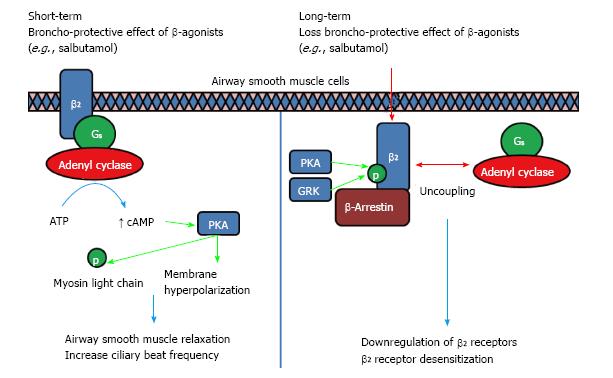Copyright
©The Author(s) 2015.
World J Respirol. Nov 28, 2015; 5(3): 199-206
Published online Nov 28, 2015. doi: 10.5320/wjr.v5.i3.199
Published online Nov 28, 2015. doi: 10.5320/wjr.v5.i3.199
Figure 1 Long-term usage of β-agonists will result in a loss of Broncho-Protective Effect where β-adrenoceptors desensitization occurs.
Broncho-Protective Effect is conferred when β-agonist binds to β2-AR, activating adenyl cyclase through Gαs, leading to an increase in cAMP levels. The surge in cAMP in turn activates PKA which phosphorylates myosin light chain to inhibit contraction. PKA also activates K+ channels, inducing membrane hyperpolarization which counteracts electrical excitation leading to contraction. Chronic use of β-agonist will lead to a loss of this Broncho-Protective Effect due to the uncoupling of Gαs from β2-AR, phosphorylation by PKA/GRK and the binding of β-arrestin which leads to internalization, downregulation and desensitization towards β-agonist[15,27,28]. PKA: Protein kinase A; GRK: G-protein receptor kinases; AR: Adrenoceptors.
- Citation: Tan DW, Wong JL, Tie ST, Abisheganaden JA, Lim AY, Wong WF. β2-adrenoceptor in obstructive airway diseases: Agonism, antagonism or both? World J Respirol 2015; 5(3): 199-206
- URL: https://www.wjgnet.com/2218-6255/full/v5/i3/199.htm
- DOI: https://dx.doi.org/10.5320/wjr.v5.i3.199









